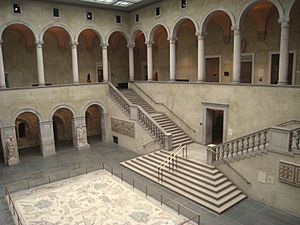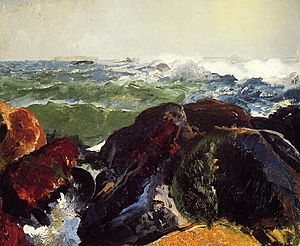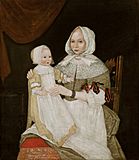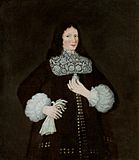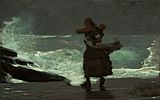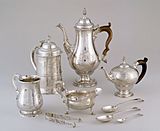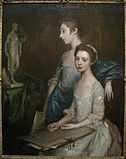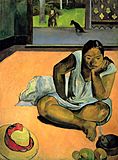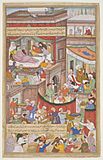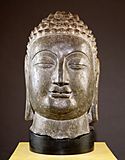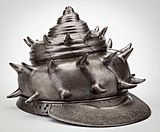Worcester Art Museum facts for kids
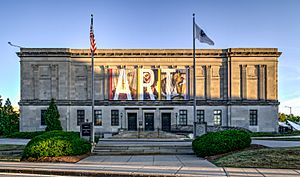
Salisbury Street facade
|
|
| Established | 1898 |
|---|---|
| Location | 55 Salisbury Street Worcester, Massachusetts |
| Type | Art museum |
| Architect | Stephen C. Earle |
| Public transit access | MBTA
Framingham/Worcester Line
Worcester |
The Worcester Art Museum is a cool place in Worcester, Massachusetts. It holds over 38,000 pieces of art from all over the world. These artworks date from ancient times to today.
The museum first opened its doors in 1898. You can see Roman mosaics, European and American art, and many Japanese prints. Since 2013, it also has one of the biggest collections of arms and armor in the Americas. The museum even has a special lab to fix old art. It also offers art classes for kids and adults all year long.
Contents
A Look at the Museum's History
In 1896, Stephen Salisbury III and his friends started the Art Museum Corporation. They wanted to build an art place "for everyone." Salisbury gave land and money to build the museum. Stephen C. Earle, an architect from Worcester, designed the building.
The museum officially opened in 1898. Reverend Daniel Merriman was its first president. At first, the museum mostly had plaster copies of old sculptures. It also had 5,000 Japanese prints, drawings, and books. These were given by John Chandler Bancroft.
In 1905, Stephen Salisbury passed away. He left most of his large fortune to the museum. The Worcester Art Museum kept growing. Many important early artworks were given by artist and collector Helen Bigelow Merriman.
Discovering Ancient Mosaics
From 1932 to 1939, the museum helped explore old cities. They joined other museums to dig at Antioch, an ancient city. This group found hundreds of amazing floor mosaics. These are now called the Antioch mosaics.
The mosaics were shared among the museums. The Worcester Art Museum got many, including the Worcester Hunt. You can see this mosaic on the floor of the Renaissance Court today.
A Major Art Theft
On May 17, 1972, some artworks were stolen from the museum. Two men took important paintings. These included The Brooding Woman and Head of a Woman by Paul Gauguin. They also took Mother and Child by Pablo Picasso. Another painting, St. Bartholomew, was also stolen. The stolen art was worth a lot of money.
New Arms and Armor Collection
In 2013, the Higgins Armory Museum in Worcester closed. Its famous collection of arms and armor moved to the Worcester Art Museum. Now, you can see these amazing pieces. They are displayed with Greek, Roman, Asian, and European art. A special gallery for arms and armor opened in 2023.
How the Museum Building Grew
The Worcester Art Museum started as a small, three-story building. Stephen C. Earle designed it, and it was built in 1897–98. The museum was planned to be much bigger from the start.
Over the years, the museum added many new parts. A back wing was added in 1920–21. A large wing facing Salisbury Street was built in 1931–33. This part includes the Chapter House and Renaissance Court. In 1939-40, a fourth floor was added to the original building.
Later, in 1970, the Higgins Education Wing was built. This added studios, classrooms, and new entrances. The Frances L. Hiatt Wing was added in 1983. It is used for special art shows. In 2015, a new walkway ramp was added to the main entrance. This made the historic entrance easy for everyone to use.
A Medieval Chapter House
In 1927, the museum bought a very old French building. It was a 12th-century chapter house. This building was part of a monastery in France. It was brought to America and set up in the museum in 1932. This was the first time a medieval building was moved from Europe to America.
The grand Renaissance Court connects to the chapter house. The floor of this court has the beautiful Antioch mosaics. These ancient treasures are from Syria and date back to the first to sixth centuries A.D.
Amazing Art Collections
The museum has many great collections. Besides the Roman mosaics and French chapter house, it has:
- European and North American paintings
- Prints, photographs, and drawings
- Asian art
- Greek and Roman sculptures and mosaics
- Modern art
European paintings include works by El Greco, Rembrandt, and Burne-Jones. There is also a room with Impressionist art. You can see paintings by Monet, Matisse, Renoir, Gauguin, and Kandinsky.
The American painting collection has art by Thomas Cole, Winslow Homer, and John Singer Sargent. You can also see works by Gilbert Stuart, who painted many portraits for the Salisbury family. In the 20th-century gallery, there are works by Franz Kline, Jackson Pollock, and Joan Mitchell.
In 1901, John Chandler Bancroft gave over 3,000 Japanese prints to the museum. This collection shows the history of Japanese woodcut printing. It has many rare, early prints from the late 17th and 18th centuries.
American Art
-
Winslow Homer, The Gale, 1883–1893
-
John La Farge, Peacock Window, 1892–1908
-
Paul Revere, Paine Service, 1773
European Art
-
Piero di Cosimo, The Discovery of Honey by Bacchus, about 1499
-
Attributed to Leonardo da Vinci and Lorenzo di Credi, A Miracle of Saint Donatus of Arezzo, about 1479
-
Thomas Gainsborough, Portrait of the Artist's Daughters, 1763–64
-
Paul Gauguin, Te Faaturuma (The Brooding Woman), 1891
Asian Art
-
Chinese, Northern Wei Dynasty, Head of a Buddha, 550–770
Arms and Armor
Returning Ancient Art
In January 2025, the Worcester Art Museum made an agreement with Italy. They agreed to return two ancient Greek vases. These vases were a black-figure amphora (around 515–500 BCE) and a black-figure kylix (around 500 BCE). They had been stolen from Italy a long time ago. The museum's researcher, Daniel W. Healey, found out they were stolen.
As part of the deal, the vases will stay at the museum for a few more years. They will have labels explaining where they came from. After that, they will go back to Italy. In return, Italy will lend the museum other similar ancient artworks. This shows the museum is working to make sure its art was collected fairly.
Museum Leaders (Directors)
- Philip T. Gentner 1908–1917
- Raymond Wyer 1918–1925
- George W. Eggers 1926–1930
- Francis Henry Taylor 1931–1939
- Charles H. Sawyer 1940–1947
- Louisa Dresser Campbell (acting director) 1943–1946
- George L. Stout 1947–1955
- Francis Henry Taylor 1955–1957
- Daniel Catton Rich 1958–1970
- Richard Stuart Teitz 1970–1981
- Tom L. Freudenheim 1982–1986
- James A. Welu 1986–2011
- Matthias Waschek 2011 –
See also
 In Spanish: Museo de Arte de Worcester para niños
In Spanish: Museo de Arte de Worcester para niños
 | John T. Biggers |
 | Thomas Blackshear |
 | Mark Bradford |
 | Beverly Buchanan |


